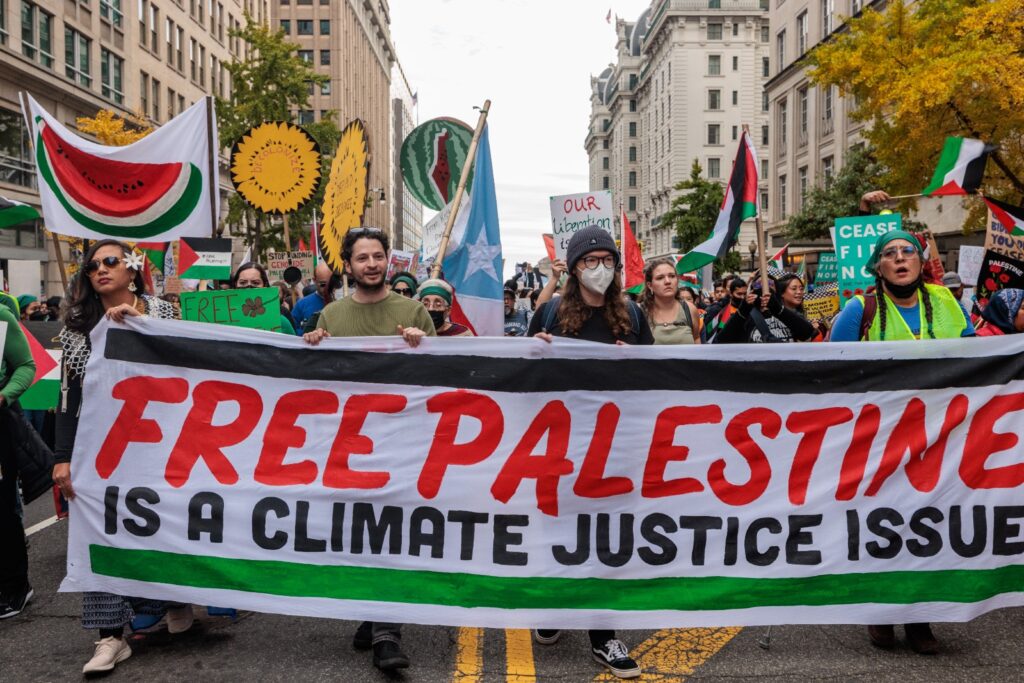
Excerpt from a talk by Alison Bodine, central organizer with Climate Convergence at a Climate Convergence Webinar “Palestine and the Struggle for Climate Justice.”
It has now been over one year since the U.S.-Israeli genocide of Palestine began. An estimated 335,000 people in Palestine (Professor Devi Sridhar, chair of global public health at the University of Edinburgh) and over 2,000 people (Lebanon’s Health Ministry) in Lebanon have been murdered by the U.S. funded Zionist Israeli military. There has been a near constant onslaught of deadly gunfire, airstrikes and chemical weapons attacks.
The U.S.-Israeli genocide has created a devastating human and environmental disaster. As of only June 2024, more bombs had been dropped on Gaza then were dropped on London, England, or Dresden and Hamburg, Germany during all of World War II. This is only one illustration of why the struggle for liberation of Palestine is a climate justice struggle.
As the people of Palestine and Lebanon continue their steadfast resistance to the U.S.-Israeli genocidal war, their heroic struggle has brought millions of people to the streets in solidarity with their fight for liberation. Over the past year, in fact, we have seen the world’s largest demonstrations in solidarity with Palestine. In many of these demonstrations we see signs and banners that call for an end to genocide and ecocide in Palestine, in Gaza, in the West Bank, in Lebanon. Climate justice activists have taken to the streets side by side with Palestine solidarity activists.
These mass demonstrations have also come with the silencing of pro-Palestine voices or actions by governments such as that in Germany, the United States and Canada. Countries that have also had environmental activists facing repression from the state, from the police, from the army. Alongside our demands of ending the genocide on Palestine, the climate justice movement must also denounce these attacks on the democratic rights to free speech and assembly and expression. We must not tolerate the silencing of voices opposed to genocidal and climate destroying governmental policies, including the genocide against Palestine. Whether it is the police repression of Wet’suwet’en Indigenous protesters fighting the Coastal GasLink fracked gas pipeline in northern British Columbia, or people gathered in the streets of Germany, London or here in Canada for Palestine.
Environmental Impact of the Israeli Occupation & Genocide on Palestine
The human and environmental destruction of Palestine did not start one year ago on October 7th, 2023.
On top of living in a constant state of siege and war over 76 years of the Israeli occupation, the people of Palestine have been denied their ability to control their own natural resources and therefore their ability to adapt and mitigate the impacts of climate change.
Israel has dropped thousands of bombs, wiping out most of Gaza’s tree cover and agricultural land. Most of the buildings in Gaza have been destroyed, leaving behind toxic debris, and chemical residues. The bombing has destroyed water and sanitation facilities deliberately as part of their genocide against the people of Palestine.
The air of Gaza is toxic, not only from the munitions used or chemical weapons such as white phosphorus, but also from the debris created by the devastating bombing. Asbestos, and other poisonous dust from building destruction are contaminating the air that is breathed by anyone who is simply looking for a safe place to be. Israel is constantly leveling all types of buildings, hospitals, schools and all of this destruction creates more and more debris in the air.
Greenhouse gas emissions from this brutal assault are on the rise every single day with increased bombing, from military vehicles, from overseas weapons shipments, which are mostly weapons shipped from the United States and Europe.
Meanwhile, major oil and gas companies, with support and subsidies from the government of the U.S. and their allies, are major economic partners with the genocidal, racist Zionist government of Israel. Israel collects hundreds of millions of dollars a year in tax revenue from gas fields operated by Chevron in the Eastern Mediterranean Sea.
After more than one year of brutal genocide carried out by the U.S. and Israel against Palestine, now more than ever, we cannot become inactive or depressed, either about the climate crisis or about the seemingly endless destruction of the U.S.-Israeli death machine. We must follow the lead of the resisting people in Palestine and Lebanon, in Yemen and fight back. We must make ending the U.S.-Israeli genocide and occupation a focus and an important struggle within the international climate justice movement. We must work to build a mass movement for climate justice and the liberation of Palestine, one that is united around demands of end the genocide, end the ecocide, ceasefire in Gaza now! United, we will win!
